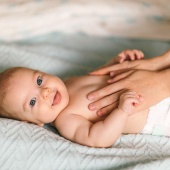What does it mean to bond with a baby, and why is it important? We look at ways parents can recognise their baby’s needs and build a connection with their baby or babies.
Bonding is a process which builds over time so that the baby and parent feel close and connected to each other (NHS Best Start in Life, no date a; Suzuki et al, 2022).
Why is bonding important?
Having a secure relationship with a parent helps the baby grow into a secure and happy child (NHS Best Start in Life, no date a).
Bonding helps babies and children (Bianciardi et al, 2023; NHS Best Start in Life, no date a; Hill & Flanagan, 2020; Suzuki et al, 2022):
- manage emotions and stress
- develop long-term mental and physical health
- be protected from the effects of a parent’s depression
- build long-term confidence
- develop good relationships into adulthood
- promote learning and verbal development
- become more resilient in later life
For parents, bonding (Bianciardi et al, 2023; Hill and Flanagan, 2020; Suzuki et al, 2022):
- promotes confidence and a secure transition to parenthood
- protects long-term mental health
- promotes relationships
- builds a sense of duty to the baby, which can make it easier to do the hard work of parenting
When does bonding start?
For some parents and babies bonding starts before birth, and for others it starts shortly after birth. Sometimes, the bond can take longer to grow (NHS Best Start in Life, no date; Suzuki et al, 2022; de Waal et al, 2023).
While in the uterus (womb), babies are aware of sounds, touch and movement. They’ll recognise their parents’ voice or voices when they are born. During pregnancy, stroking the bump and talking to the baby will help them feel calm and secure (NHS Best Start in Life, no date a).
How do parents bond with their baby?
Bonding is built by both parent and baby interacting and making connections in the brain. This can start during pregnancy or after birth (de Waal et al, 2023; NHS Best Start in Life, no date a; Suzuki et al, 2022).
Interactions could be while carrying out any baby care activities and at the same time (NHS Best Start in Life, no date a):
- talking or reading
- singing
- looking into each other’s eyes
- playing
The parent can boost healthy connections by responding to the baby appropriately. This might be giving them a cuddle when they are sad, or picking them up when they reach out to the parent. It might also be by (NHS Best Start in Life, no date b):
- comforting them
- rocking them
- stroking them
- feeding them
Does skin-to-skin contact help with bonding?
Skin-to-skin contact with the baby is known to be important for mothers and birthing people and their babies. And research shows that regular skin-to-skin contact helps fathers bond with their baby. Fathers who have bonded also continue to take a greater role in the baby’s care (Yurdal and Özsoy, 2025).
While the research we mention here was on fathers, we can assume that the same is true of all non-birthing parents, including co-parents or intended parents.
What are baby states?
Understanding your baby is easier when you can recognise when they want to play, eat, sleep, cuddle or rest. Over time and by paying attention, parents learn how to respond appropriately (NHS Best Start in Life, no date b).
The baby moves through six states:
Deep sleep – it’s difficult to wake them, so take the opportunity to rest
Light sleep – even if they appear to be moving or lightly fussing, avoid disturbing the baby if possible as they’re more likely to wake.
Drowsy or dozing – let the baby decide if they want to sleep longer. With care, it is possible to feed a drowsy baby.
Quiet and alert – the baby is ready to play, feed or enjoy spending time together.
Fussing – after a short period of interaction the baby may need a break. They show this by appearing agitated, turning away or making jerky movements. Tune in to respond to the baby’s needs – they may be hungry, tired, or overstimulated. If they aren’t responded to appropriately it can lead to crying.
Crying – parents need to soothe the baby before doing anything else. Read more about crying.
The Institute of Health Visiting (IHV) has videos explaining the six states and how parents can get to know their baby.
What is mind-minded parenting?
Mind-minded parenting recognises children as having independent thoughts and feelings. There is evidence this interaction helps children’s social development (Dewar, 2018).
A parent can (Dewar, 2018):
- consider that their baby's behaviour has meaning
- actively try to understand their baby's emotions, desires and interests
- look for their baby’s communication cues and interpret them correctly, for example responding to hunger cues with a feed
- talk about what the baby is thinking. For example, when the baby is reaching for a toy, saying “it looks like you want that toy”.
What if bonding feels difficult?
It’s not uncommon for parents to find bonding challenging to begin with. Looking after a baby is very demanding, especially when also experiencing lack of sleep (NHS, Best Start in Life, no date a).
Parents might especially find it difficult to bond with their baby if they have (NHS Best Start in Life, no date a; Bianciardi et al, 2023; Suzuki et al, 2022):
- had negative experiences in their own childhood, including a difficult relationship with their own parents
- had difficulty conceiving or a challenging pregnancy or birth
- experienced the loss of a baby in the past
- mental health difficulties
- money worries
- a difficult relationship with their partner
- been raised to believe childcare is not part of their role
While fathers and co-parents may not feel as close to the baby as mothers or birthing people after the birth, the time the father or co-parent spends interacting with the baby can improve bonding (Suzuki et al, 2022).
Being involved in pregnancy, childbirth and parenting activities, promotes opportunities for bonding (de Waal et al, 2023).
Connecting again when bonding has felt hard
Even when things have been tough, connecting with the baby again helps them learn that the relationship is safe and secure (NHS Best Start in Life, no date a).
Talking to a health visitor or GP, or getting support at a family hub, can help if a parent is worried about their relationship with their baby.
Bianciardi, E., Ongaretto, F., De Stefano, A., Siracusano, A., & Niolu, C. (2023). The Mother-Baby Bond: Role of Past and Current Relationships. Children, 10(3), 421. https://doi.org/10.3390/children10030421
Challacombe, F.L., Nath, S., Trevillion, K. et al. (2021) Fear of childbirth during pregnancy: associations with observed mother-infant interactions and perceived bonding. Arch Womens Ment Health 24, 483–492. https://doi.org/10.1007/s00737-020-01098-w
de Waal, N., van den Heuvel, M. I., Nyklíček, I., Pop, V. J. M., & Boekhorst, M. G. B. M. (2023). Paternal bonding in pregnancy and early parenthood: a qualitative study in first-time fathers. Journal of Reproductive and Infant Psychology, 43(3), 665–680. https://doi.org/10.1080/02646838.2023.2252890
Dewar G (2018) Mind-minded parenting: Does insightful talk about the mind help children bond and learn? https://parentingscience.com/mind-minded-parenting/ [17 Nov 25]
Hill, R. and Flanagan, J. (2020), The Maternal–Infant Bond: Clarifying the Concept. Int J Nurs Terminol Knowledge, 31: 14-18. https://doi.org/10.1111/2047-3095.12235
NHS Best Start in Life (no date a) Building a close relationship with your baby. https://www.nhs.uk/best-start-in-life/baby/baby-basics/bonding-with-you… [17 Nov 25]
NHS Best Start in Life (no date b) Understanding your baby. https://www.nhs.uk/best-start-in-life/baby/baby-basics/bonding-with-you… [17 Nov 25]
Schaber R, Kopp M, Zähringer A, Mack JT, Kress V, Garthus-Niegel S (2021) Paternal Leave and Father-Infant Bonding: Findings From the Population-Based Cohort Study DREAM. Frontiers in Psychology, 12. https://doi.org/10.3389/fpsyg.2021.668028
Suzuki, D., Ohashi, Y., Shinohara, E., Usui, Y., Yamada, F., Yamaji, N., Sasayama, K., Suzuki, H., Nieva, R. F., Jr., da Silva Lopes, K., Miyazawa, J., Hase, M., Kabashima, M., & Ota, E. (2022). The Current Concept of Paternal Bonding: A Systematic Scoping Review. Healthcare, 10(11), 2265. https://doi.org/10.3390/healthcare10112265
Yurdal, N.E.Ö., Özsoy, S. (2025) Effect of skin to skin contact on father infant bonding in a randomized controlled trial. Sci Rep 15, 40728. https://doi.org/10.1038/s41598-025-24589-1








